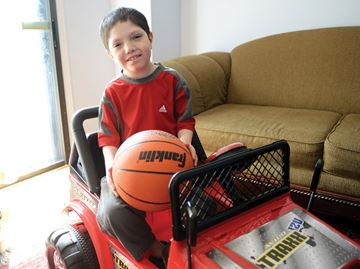Unique toy car puts Ajax boy in the driver’s seat
 Unique toy car puts Ajax boy in the driver’s seat
Unique toy car puts Ajax boy in the driver’s seat
Go Baby Go project sees toy cars customized for children with special needs
Call all designers!
Calling all designers!
The clothing and rehabilitation needs of kids with disabilities across the world are not being adequately met and teams across the world are coming together to share designs to address those needs through the University of Delaware’s Super Suits Program.
That is why Michele Lobo launched the Super Suits Program in 2013. She has brought together an amazing team from rehabilitation, child development, engineering, and fashion/apparel studies to work closely with children and their families to help kids move, play, and learn. Martha Hall has served as the lead fashion designer for the Super Suits Program since 2014. This program inspired the first SewBabySew!student organization, founded at the University of Delaware in 2014.
Lobo started the program designing the first garments that served as exoskeletons to support movement and now oversees projects ranging from: 1) Anyone Can Do It Projects, such as making scarves that look fashionable but function to keep kids with oral motor problems dry, to2) If You and Your Friends Like Sewing You Can Do It, such as working one on one with children and families to design outfits that meet the children’s needs and make them feel fabulous, to 3) If You and Your Friends Like Sewing and Basic Tinkering You Can Do It,such as making exoskeletal garments and postural support garments, and finally to 4) If You and Your Friends Like Sewing and Serious Tinkering You Can Do It, such as making clothing that will sense your actions and trigger events like the shirt lighting up or electronics in the environment activating or designing custom pneumatic robotic clothing using 3d printed molds.
Moving, Playing, Exploring, Learning.
“We are aiming to reshape the process by which clothing and rehabilitation devices are developed,” Lobo says. “It is no longer acceptable to develop ugly, bulky, expensive, uncomfortable clothing and devices for people with disabilities and expect them to be grateful for these products when they are first presented to them at the end of the design process. Everything you and I buy involves a more holistic design process that considers our broad needs. It is not enough that our phone, shoes, furniture, etc. function. They must also have the right cost, feel, and look or we will not buy them. It is time to involve users with disabilities in the design process from the start, to ask them what they want, and to provide them inexpensive, accessible options to meet their needs.”
This is critical to empower people with disabilities to define and express themselves as they choose, highlighting what is unique about them rather than what is challenging for them. It is critical for rehabilitation because for devices to be effective, users must choose to use them.
To learn more about this research, contact Michele Lobo.
